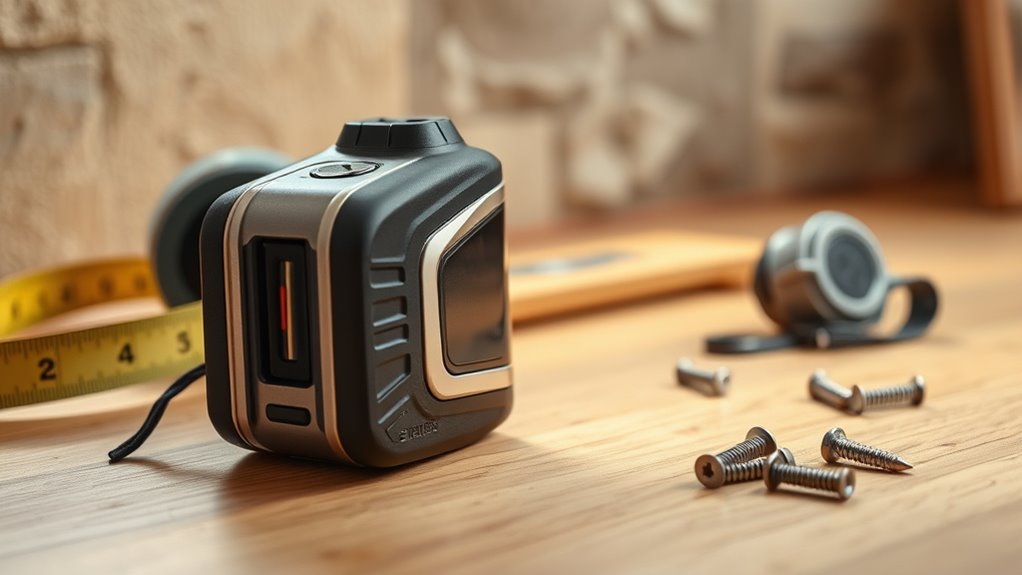If you’re tackling wall projects, I’ve got the scoop on the 15 best stud finders out there. From the reliable 52300 Studball Magnetic Stud Finder to the advanced Franklin Sensors ProSensor M210, there’s a perfect tool for your needs. Whether you want something simple or a multifunctional locator, these options cater to all. I’ll guide you through the features and benefits to help you make an informed choice that fits your requirements.
Key Takeaways
- Explore various types of stud finders, including magnetic, electronic, and advanced options for different project needs and accuracy levels.
- Consider features like detection capabilities for wood, metal, pipes, and live wires to enhance safety and functionality.
- Evaluate user-friendly designs that simplify operation, improve efficiency, and provide safety alerts during wall projects.
- Compare price ranges, warranty options, and additional considerations to ensure you select the best value for your specific requirements.
- Read expert reviews and user feedback to identify the most reliable and effective stud finders for your DIY or professional projects.
52300 Studball Magnetic Stud Finder

If you’re looking for a reliable and easy-to-use stud finder, the 52300 Studball Magnetic Stud Finder is a fantastic choice for DIY enthusiasts and homeowners alike. This little tool packs a punch with a strong magnetic force that detects metal through drywall, wood, and even ceramic tiles. I love how quickly it locates screws and nails—finding over 40 steel studs in under a minute is impressive! Plus, it doesn’t require batteries, which is a huge plus. Its bright red color makes it easy to spot in my toolbox, ensuring I always have it on hand for my home projects.
Best For: DIY enthusiasts and homeowners looking for a quick and reliable tool to locate studs and metal objects without the need for batteries.
Pros:
- Strong magnetic force allows for effective detection through various materials, including drywall and ceramic tile.
- Fast detection capabilities enable users to find multiple studs in under a minute.
- No battery requirement ensures hassle-free operation and reduces maintenance.
Cons:
- May be less effective on certain types of tiles, leading to mixed results.
- Some users report limitations when detecting metal objects in thicker materials.
- Not the best option available compared to more advanced stud finders on the market.
Stud Finder Wall Scanner Detector – 5 in 1 Electronic Locator
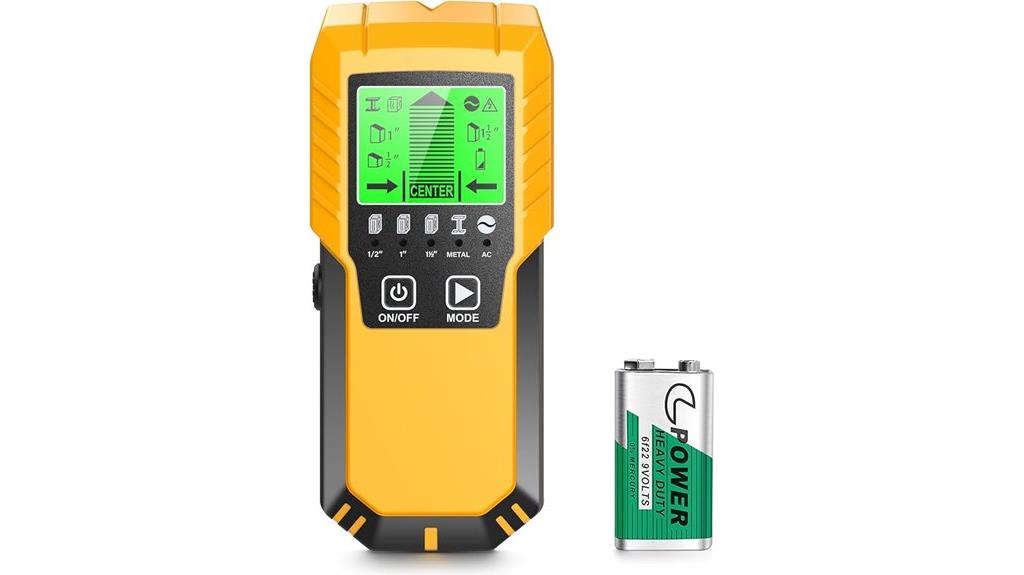
The Stud Finder Wall Scanner Detector is perfect for DIY enthusiasts and professionals alike who need a reliable tool for precise wall projects. This 5 in 1 electronic locator detects edges and centers of wood, metal, pipes, and even live AC wires, making it a versatile choice. With five scanning modes, including deep scan capability, I can confidently tackle any job without worrying about hidden hazards. The bright backlight LCD and audio alerts guarantee I stay informed as I work. Plus, its durable design means it can handle tough conditions, making it a great addition to my toolkit.
Best For: DIY enthusiasts and professionals seeking a reliable tool for detecting hidden objects in walls, floors, and ceilings.
Pros:
- Versatile 5 in 1 functionality for detecting wood, metal, pipes, and live wires.
- Bright backlight LCD and audio alerts for easy use and visibility.
- Durable design that is shock-resistant and dust-resistant, ideal for tough working conditions.
Cons:
- Mixed user reviews regarding accuracy and calibration, leading to potential inconsistencies.
- Some users report difficulties in ease of use, particularly for beginners.
- The reliance on battery power may require frequent replacements, depending on usage.
Franklin Sensors ProSensor M210 Stud Finder
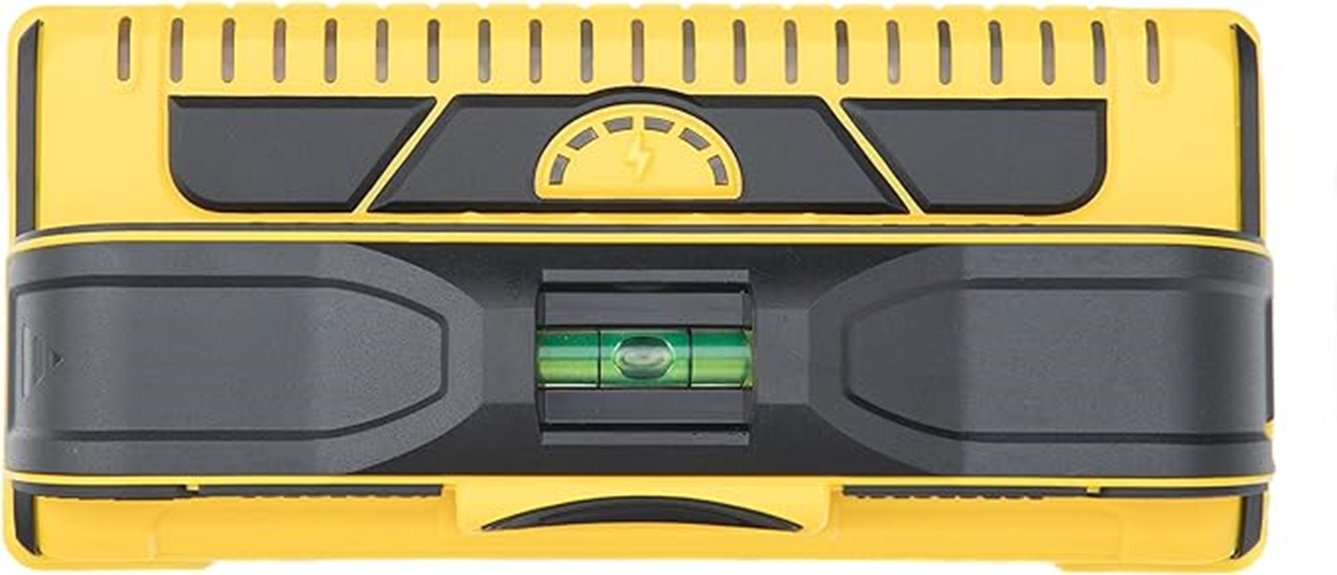
For anyone tackling home improvement projects, the Franklin Sensors ProSensor M210 Stud Finder stands out as a reliable companion. With its 13 patented sensors, it detects both wood and metal studs with impressive accuracy. I love the wide LED display that clearly shows stud edges and centers, making my tasks easier. Plus, the deep scan capability of up to 1.7 inches is a game-changer. The ergonomic design feels great in hand, and I appreciate the live wire detection feature, though it can be inconsistent. Overall, it’s a solid investment for anyone serious about DIY or renovation projects.
Best For: The Franklin Sensors ProSensor M210 Stud Finder is best for professionals and DIY enthusiasts looking for an accurate and reliable tool to assist with home improvement projects.
Pros:
- Accurate Detection: Utilizes 13 patented sensors for precise identification of wood and metal studs.
- Wide LED Display: Clearly shows stud edges and centers, enhancing user experience.
- Ergonomic Design: Comfortable to hold and easy to use, making it suitable for extended projects.
Cons:
- Bulky Size: Some users find it challenging to maneuver in tight spaces.
- Continuous Button Press Required: Scanning requires holding down a button, which can be inconvenient.
- Inconsistent Live Wire Detection: Alerts for live wires may not always be reliable.
Stud Finder Wall Scanner – 5 in 1 Stud Finder Tool
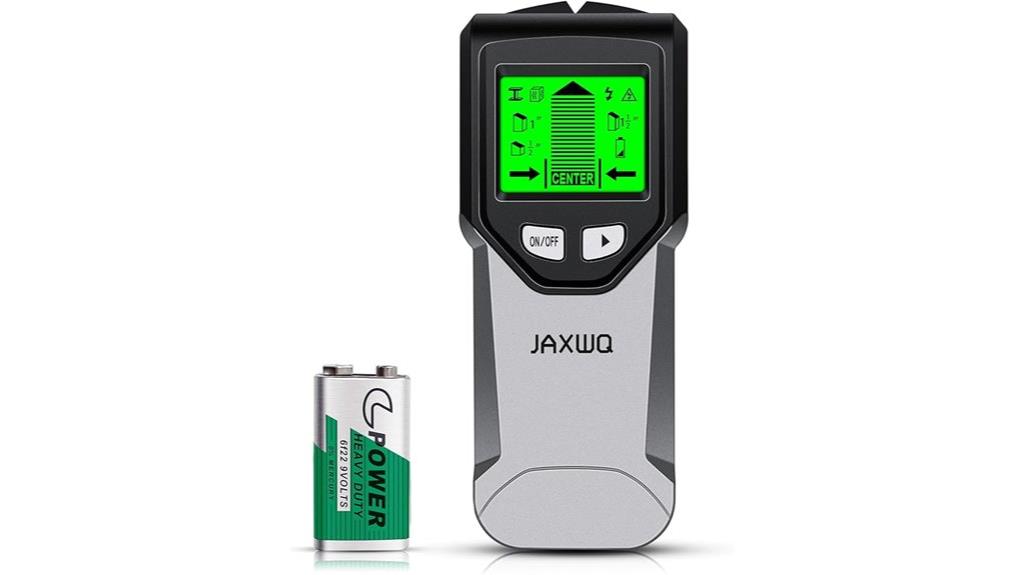
Designed with both professionals and DIY enthusiasts in mind, the Stud Finder Wall Scanner – 5 in 1 Stud Finder Tool stands out for its intelligent microprocessor chip that guarantees quick and accurate detection of materials behind walls, floors, and ceilings. Weighing just 8.1 ounces, it’s lightweight and easy to handle. The bright, backlit LCD display shows not just the center and edge of studs, but also alerts you to live wires. With multiple scan modes for wood, metal, and larger objects, it’s my go-to tool for safe and efficient home improvement projects. Plus, it’s incredibly user-friendly!
Best For: Homeowners and DIY enthusiasts looking for a reliable tool to safely locate studs, metal, and live wires during home improvement projects.
Pros:
- High accuracy with quick detection of materials behind walls, floors, and ceilings.
- User-friendly design with a bright, backlit LCD display and audio alerts for guidance.
- Multiple scan modes for versatility, allowing detection of wood, metal, and larger objects.
Cons:
- Some users report needing to perform multiple scans for optimal accuracy.
- Limited warranty information available; specific details must be obtained from the manufacturer.
- May not detect certain materials or objects in unconventional wall constructions.
Stud Finder Wall Scanner, 5 in 1 Multifunction Locator
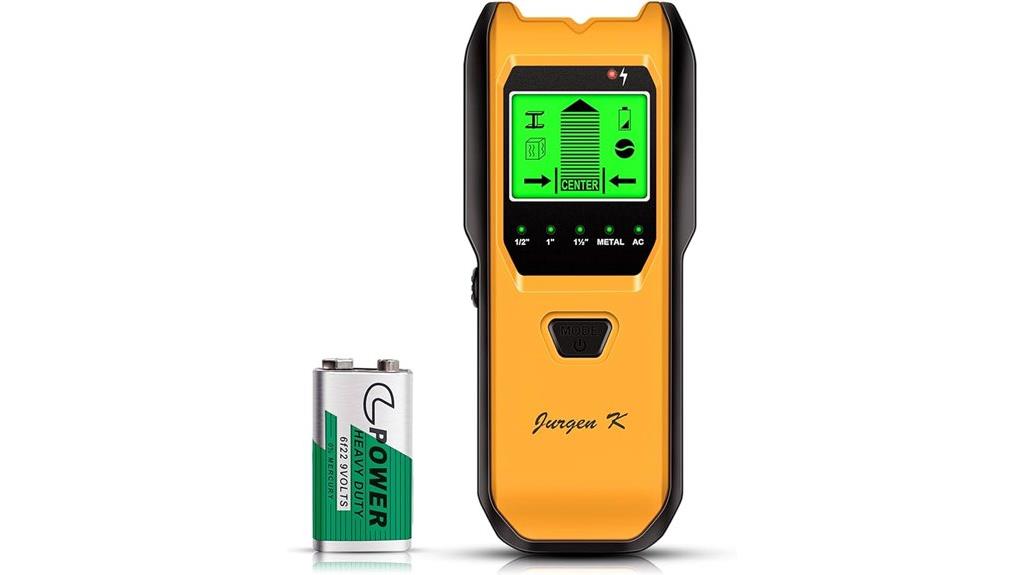
Looking for a reliable tool to simplify your wall projects? The Stud Finder Wall Scanner, model Jurgen K TH530, is a game-changer. Weighing just 10.2 ounces, this 5 in 1 multifunction locator quickly detects wood, metal, and AC wires with multi-sensing technology. Its HD LCD screen displays clear information, and the non-slip grip guarantees comfort during use. With different detection modes for various depths, it adapts to any wall surface. While some users noted calibration challenges, its overall accuracy and build quality shine through. For DIY enthusiasts and professionals alike, this tool is a must-have!
Best For: DIY enthusiasts and professionals looking for an accurate and user-friendly tool for detecting materials in walls.
Pros:
- High detection accuracy for wood, metal, and AC wires thanks to multi-sensing technology.
- Ergonomic design with a non-slip grip for comfortable handling during use.
- Intuitive HD LCD screen with backlight and audio alarm for clear feedback.
Cons:
- Some users report inconsistent performance, particularly in wire and metal detection modes.
- Calibration can be challenging for optimal accuracy, requiring careful attention.
- Users are advised to read the manual thoroughly to understand all functions.
Franklin Sensors ProSensor M150/X990 Stud Finder
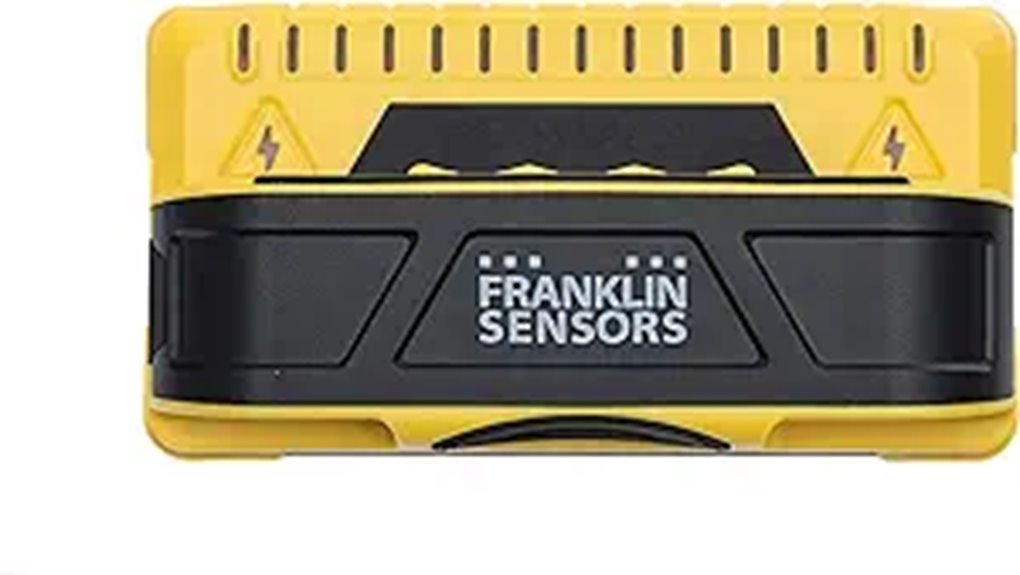
The Franklin Sensors ProSensor M150/X990 Stud Finder stands out as an exceptional choice for both DIY enthusiasts and professionals, thanks to its nine-sensor technology that enhances detection accuracy. With a maximum detection depth of 1.5 inches, it easily identifies metal and wood studs through drywall and other materials. I love how it displays the center and edges of studs simultaneously, making my projects smoother. Plus, the live wire detection adds an extra layer of safety. Users rave about its reliability and ease of use, and with an average rating of 4.5 stars, it’s clear this stud finder is a top pick!
Best For: DIY enthusiasts and professionals looking for an accurate and reliable stud finder.
Pros:
- Accurate detection of metal and wood studs with nine sensors for enhanced precision.
- Simultaneous display of stud centers and edges for easier project planning.
- Live wire detection feature adds safety while working on various projects.
Cons:
- Live wire detection may not be as precise as stud detection.
- Requires 2 AAA batteries, which are not included.
- Not compatible with rechargeable batteries, limiting battery options.
CRAFTSMAN Stud Finder, 3/4-Inch Depth (CMHT77633)

If you need a reliable tool for hanging items securely, the CRAFTSMAN Stud Finder (CMHT77633) is an excellent choice. Weighing just 3.2 ounces, it’s compact and easy to handle, perfect for any DIY project. This stud finder locates both wood and metal studs, even through wallpaper or fabric, ensuring you avoid unnecessary wall damage. With its shock-resistant and water-resistant design, it’s built to last. Plus, it even detects energized wires, adding an extra layer of safety. Though some users report calibration issues, its overall accuracy and ease of use make it a great addition to my toolkit.
Best For: Homeowners and young adults looking for an easy-to-use tool for securely hanging items.
Pros:
- Compact and lightweight design, making it easy to handle during DIY projects.
- Accurately locates both wood and metal studs, even through wallpaper and fabric.
- Durable construction with shock-resistant and water-resistant features.
Cons:
- Some users have reported calibration issues leading to inconsistent detection.
- The design may feel rough when sliding over walls, affecting usability.
- Requires a 9V battery, which is not included with the product.
DEWALT Stud Finder (DW0100)
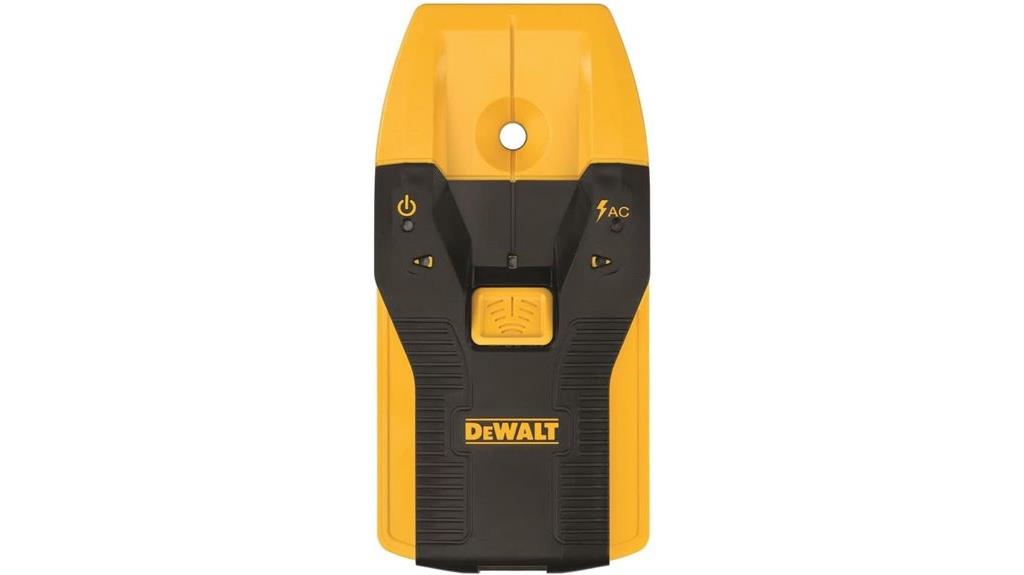
For anyone tackling DIY home improvement projects, the DEWALT Stud Finder (Model DW0100) stands out with its center-find technology, making stud locating both efficient and straightforward. It detects wood and metal up to 3/4 inch deep, and its slim design makes it easy to handle and store. I love the audible alerts and clear LED arrows that guide you right to the stud. Plus, with features like AC detection and constant auto-calibration, it minimizes guesswork. While some users mention occasional false positives, overall, it’s a reliable tool that’s essential for any DIY enthusiast.
Best For: DIY enthusiasts and homeowners looking for a reliable tool to locate studs in drywall and other wall materials.
Pros:
- Clear LED indicators and audible alerts make locating studs straightforward.
- Slim and compact design allows for easy handling and storage.
- Features like AC detection and constant auto-calibration enhance usability and accuracy.
Cons:
- Some users report inconsistent readings and occasional false positives.
- Performance can vary based on wall material and texture.
- Requires a steady hand and proper technique for optimal accuracy.
Stud Finder Wall Scanner, 5-in-1 Detector
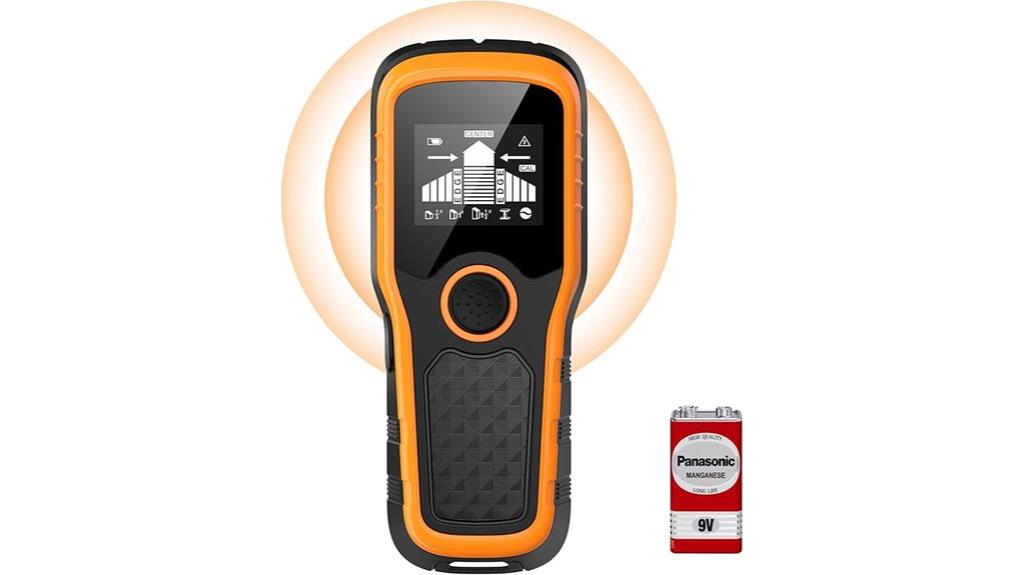
Looking for a reliable tool that combines versatility and accuracy? The Stud Finder Wall Scanner, 5-in-1 Detector is just what you need. With its advanced capabilities, it detects wood, metal, joists, pipes, and AC wires, making it perfect for any project. The high-definition LCD display provides clear readings on depth and battery life, while the audible alarm guarantees you pinpoint locations precisely. Its ergonomic design makes it comfortable to hold during extended use. Plus, automatic calibration and live wire detection enhance safety. Rated 4.5 stars by users, this tool truly delivers on accuracy and performance. You won’t be disappointed!
Best For: Professionals, homeowners, and DIY enthusiasts looking for a reliable and versatile tool for detecting various materials within walls.
Pros:
- Accurate Detection: Advanced 5-in-1 capabilities for identifying wood, metal, joists, pipes, and AC wires.
- User-Friendly Design: Ergonomic, lightweight structure with a high-definition LCD display for easy operation.
- Safety Features: Automatic calibration and live wire detection to prevent accidental drilling.
Cons:
- Battery Dependency: Requires batteries which may need replacement during extensive use.
- Learning Curve: Some users may require time to get accustomed to the various scanning modes.
- Limited Depth: Detection capabilities may vary depending on wall thickness and material composition.
StudBuddy Magnetic Stud Finder Tool
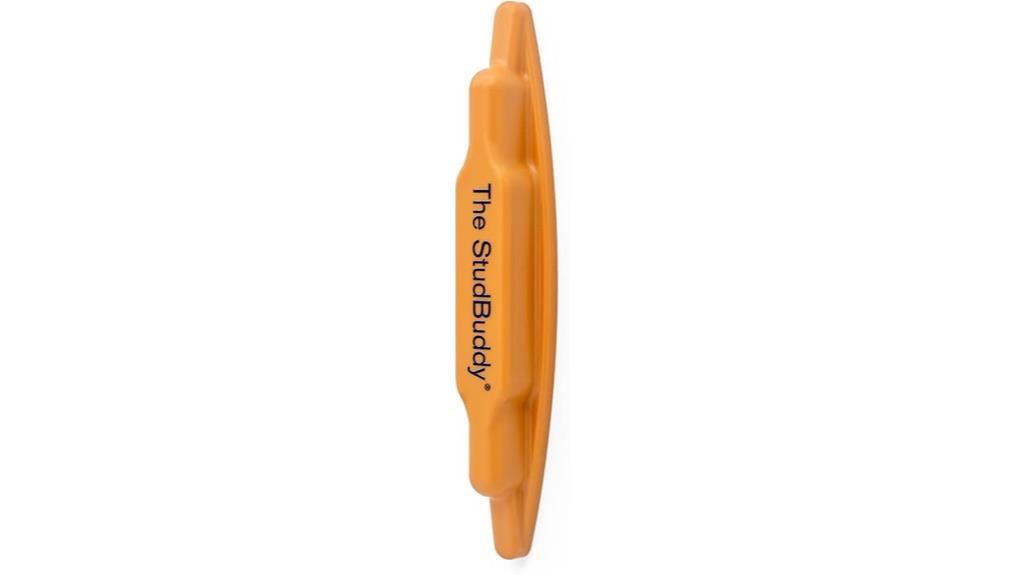
The StudBuddy Magnetic Stud Finder Tool stands out as the ultimate choice for DIY enthusiasts who want a reliable and straightforward solution for locating studs in drywall. Weighing just 1.6 ounces and measuring 5.75 x 1 x 1.25 inches, it’s incredibly portable. With super-strong neodymium magnets, it quickly finds screw or nail heads, hanging on the wall to mark exact stud locations for your projects. I love that it requires no batteries and is ready to use right away. Plus, with a 4.5-star rating from nearly 14,000 users, it’s clear this tool is a favorite for its simplicity and effectiveness.
Best For: DIY enthusiasts looking for a reliable and easy-to-use tool for locating studs in drywall.
Pros:
- Lightweight and Portable: At just 1.6 ounces, it’s easy to carry and handle during projects.
- No Batteries Required: Always ready for use without the need for batteries or calibration.
- High User Satisfaction: Rated 4.5 stars by nearly 14,000 users for its effectiveness and simplicity.
Cons:
- Limited to Drywall: Not suitable for lath and plaster walls, which may restrict its use in older homes.
- Nail Detection Limitations: May not work as effectively in homes that use nails instead of screws for drywall.
- Basic Functionality: Lacks the advanced features of electronic stud finders, which some users may prefer.
Franklin Sensors ProSensor M90 Stud Finder
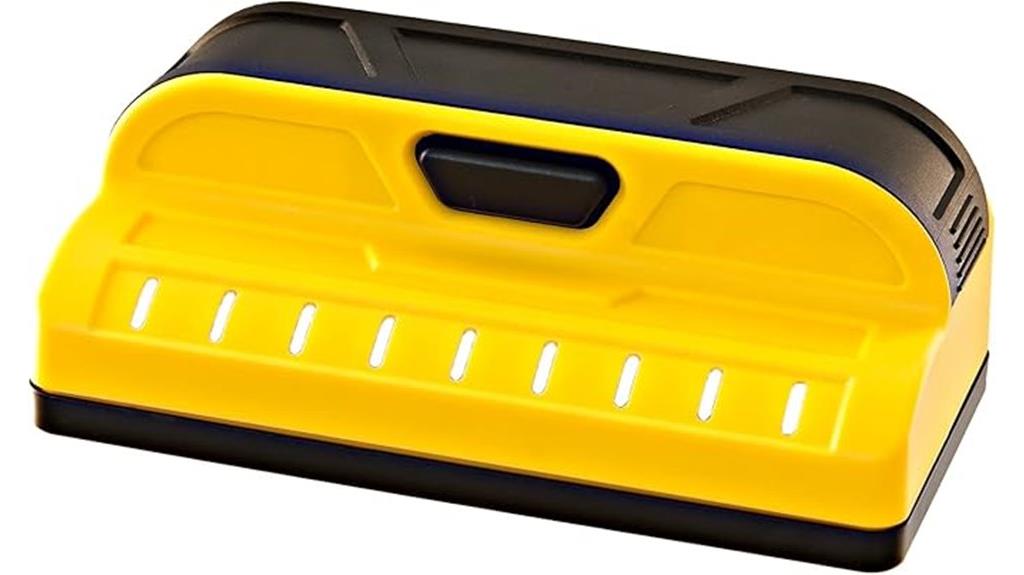
Designed with nine sensors, the Franklin Sensors ProSensor M90 Stud Finder stands out as an ideal choice for DIY enthusiasts and professionals alike. Its impressive detection depth of 1.5 inches allows me to find both wood and metal studs effortlessly. I love that it displays the center and edges of studs simultaneously, which makes my projects quicker and more precise. No calibration is required; I just press and hold to scan. Plus, its ergonomic design fits comfortably in my hand. With an average rating of 4.4 stars, it’s clear that many others appreciate its reliability for home improvement tasks.
Best For: DIY enthusiasts and professionals seeking a reliable and accurate stud finder for home improvement projects.
Pros:
- Accurate readings with 9 sensors for high precision.
- User-friendly operation with no calibration needed.
- Ergonomic design for comfortable use over extended periods.
Cons:
- Batteries are not rechargeable, requiring regular replacements.
- Some users may experience issues with individual units.
- Detection depth limited to 1.5 inches, which may not suffice for all materials.
WALABOT DIY 2 – Advanced Stud Finder and Wall Scanner for Smartphones

With its ability to visually identify studs, pipes, and wires through your smartphone, WALABOT DIY 2 stands out as a top choice for both DIY enthusiasts and professionals tackling wall projects. I love how it connects directly to my phone via internal Wi-Fi, making setup a breeze. The visual interface gives me confidence, especially when I’m drilling or installing fixtures. While some users mention issues with connectivity and price, I appreciate the accuracy and reliability compared to traditional stud finders. Overall, it’s a fantastic tool for anyone looking to simplify their home improvement tasks.
Best For: DIY enthusiasts and professionals such as contractors, electricians, plumbers, and carpenters looking for an advanced wall scanner for home improvement projects.
Pros:
- Offers advanced visual identification of studs, pipes, and wires, enhancing confidence during installation.
- Connects easily to smartphones via internal Wi-Fi, simplifying setup and operation.
- Provides improved accuracy and reliability compared to traditional stud finders.
Cons:
- Some users experience connectivity issues, particularly with Wi-Fi.
- The device is considered pricey by some, with accessories seen as overpriced.
- Requires two hands for operation, which may be inconvenient during use.
Klein Tools ESF150LL Electronic Stud Finder

If you’re tackling wall projects and need precision, the Klein Tools ESF150LL Electronic Stud Finder is your go-to tool. This handy device detects hidden wood and metal studs up to 1-1/2 inches deep, and the auto deep scan feature enhances accuracy. I love the horizontal and vertical cross-line lasers—perfect for marking tasks. The bright green LEDs and adjustable alerts make finding studs easy, while the bubble level allows for quick alignment. Plus, its durable design can withstand drops, and it runs on standard AA batteries. Overall, this tool delivers reliable performance for any DIY project.
Best For: DIY enthusiasts and professionals looking for an accurate and user-friendly stud finder with additional marking features.
Pros:
- Versatile Functionality: Detects both wood and metal studs up to 1-1/2 inches deep with an auto deep scan feature.
- User-Friendly Design: Ergonomic grip and bubble level allow for easy one-handed operation and quick alignment.
- Enhanced Marking Tools: Includes horizontal and vertical cross-line lasers for precise markings.
Cons:
- Inconsistent Results: Some users report variability in the accuracy of stud detection.
- Confusing Indicators: A few customers find the indicator lights challenging to interpret.
- Limited Depth Detection: Only detects studs up to 1-1/2 inches deep, which may not suit all applications.
Stud Finder Wall Scanner, 6-in-1 Tool for Drywall Stud Detection
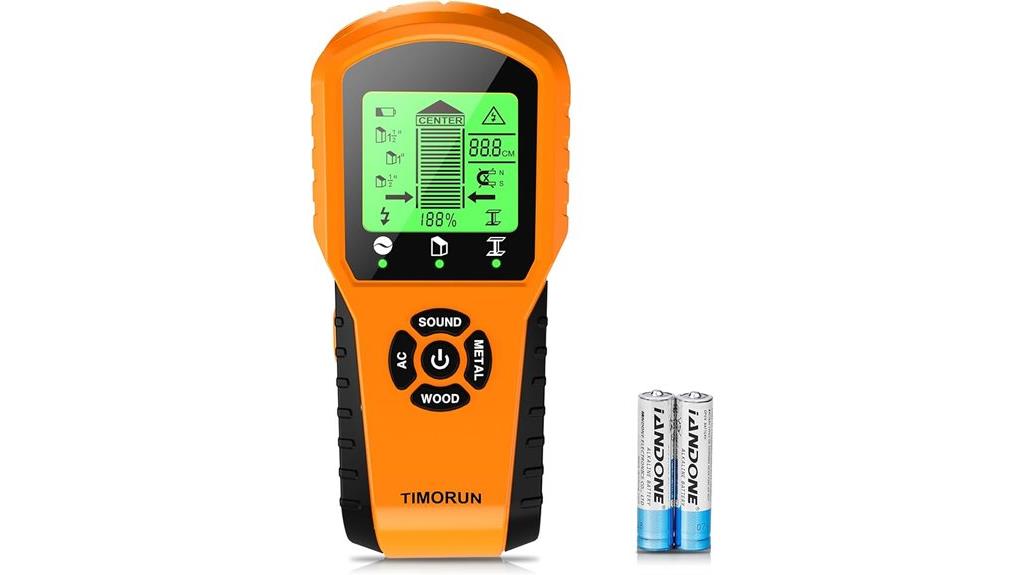
The Stud Finder Wall Scanner stands out as the best choice for DIY enthusiasts and professionals alike, thanks to its upgraded 6-in-1 functionality that makes detecting drywall studs a breeze. It features an HD LCD screen and upgraded sensors, ensuring accurate results every time. I love its gear-shaped design, which simplifies marking drilling points. With three detection depths, I can easily adapt to various drywall thicknesses. Its stud, metal, and AC modes make it versatile for any project. Users rave about its accuracy, though some report minor alignment issues. Overall, it’s a reliable tool for any home improvement task!
Best For: DIY enthusiasts and professionals seeking a reliable tool for accurate drywall stud detection and home improvement projects.
Pros:
- Versatile 6-in-1 functionality with multiple detection modes for studs, metals, and AC wires.
- User-friendly interface with an HD LCD screen for clear readings and audio indicators.
- Compact, ergonomic design for comfort during extended use, making it ideal for both casual and professional tasks.
Cons:
- Some users have reported minor alignment issues affecting accuracy in certain situations.
- Effectiveness in wire detection may vary, with some users experiencing challenges.
- Limited to detecting non-ferrous and ferrous metals up to specific depths, which may not suit all needs.
Stud Finder Wall Scanner – 5 in 1 Tool
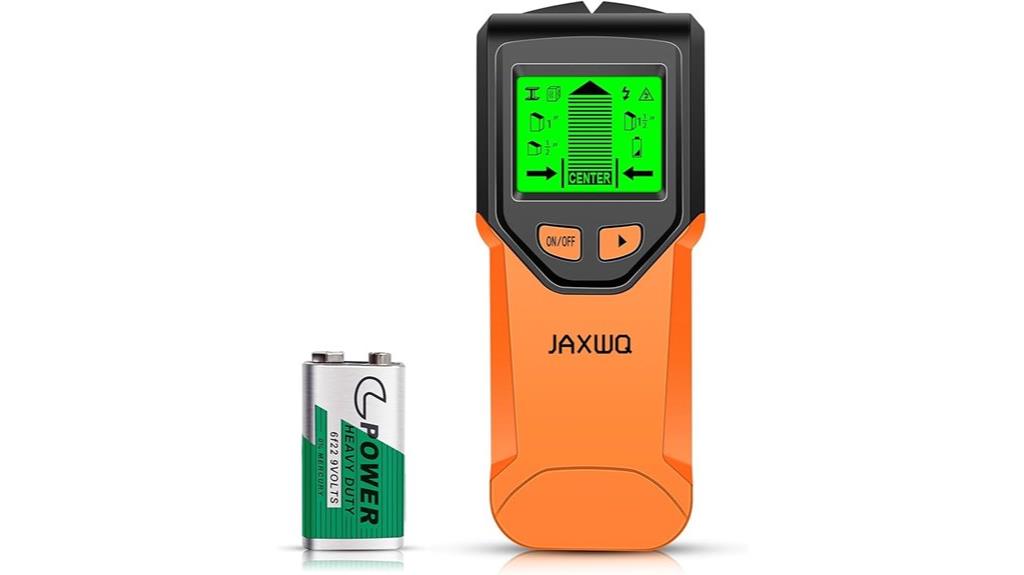
Looking for a reliable tool to tackle your wall projects? The Stud Finder Wall Scanner – 5 in 1 Tool has you covered. With its intelligent microprocessor chip and HD LCD display, it quickly locates the center and edges of wood, metal studs, and even AC wires. I love how the bright screen and audio alerts guide me right to what I need. It’s perfect for hanging shelves or TV mounts, and the safety features help avoid accidents. While some users report inconsistencies, I find it effective for most general tasks around the house. It’s definitely a handy addition to my toolkit!
Best For: Home improvement enthusiasts looking for a versatile and user-friendly tool to locate studs and wires behind walls.
Pros:
- Lightweight and easy to use, making it suitable for both novices and experienced users.
- Fast detection capabilities save time and effort on projects.
- Bright, backlit LCD display with audio alerts ensures accurate locating in various lighting conditions.
Cons:
- Users have reported inconsistent detection and potential false positives.
- Reliability issues may arise, affecting the precision of findings.
- Not ideal for tasks requiring high accuracy due to accuracy concerns.
Factors to Consider When Choosing Stud Finders for Wall Projects
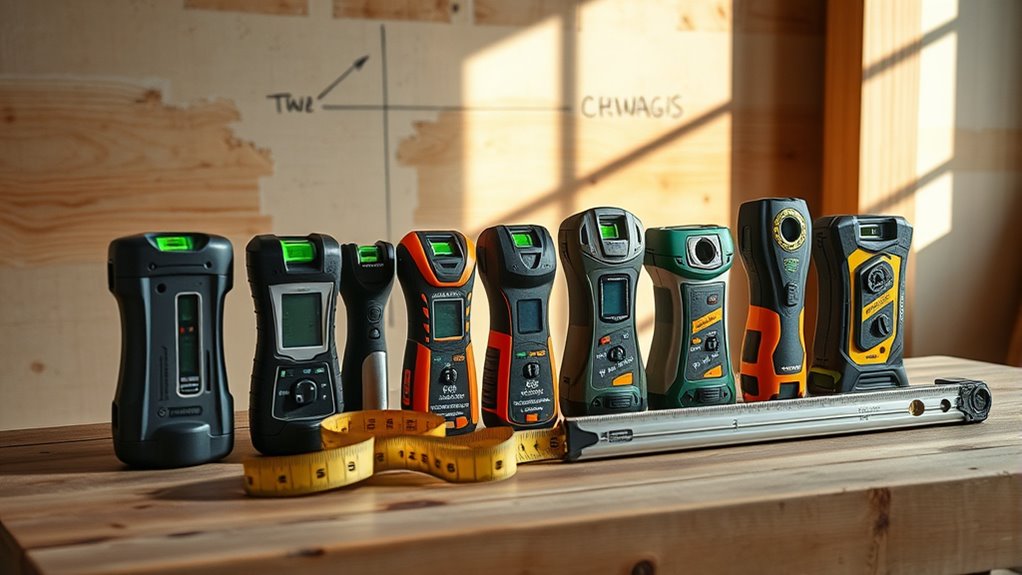
When I’m picking a stud finder for my wall projects, I think about several key factors. Detection depth, ease of use, and whether it runs on batteries or is manual are all important to me. Plus, I always check for safety features to guarantee I’m working smart and safe.
Detection Depth Capabilities
Choosing the right stud finder for your wall projects hinges on understanding its detection depth capabilities. I’ve found that detection depth can vary considerably; some stud finders detect up to 1.5 inches for wood and metal, while others penetrate deeper for pipes and wires. Many electronic models offer multiple scanning modes, typically ranging from 0.5 inches to 2.36 inches, depending on the material. If you’re using thicker drywall or additional layers, you’ll want a stud finder with enhanced detection features for accurate results. Magnetic stud finders are more limited, usually detecting only screws or nails without reaching deeper materials. Models with auto-calibration can adjust detection depth based on what they’re scanning, improving accuracy and minimizing false readings.
Battery vs. Manual Operation
There are two main types of stud finders to evaluate: battery-operated and manual. I find that battery-operated models usually come with advanced features like multiple scanning modes and deeper detection capabilities. They often include functionalities like live wire detection and audio alerts, which really enhance safety and accuracy during my wall projects. On the other hand, manual stud finders, particularly magnetic types, don’t need batteries, making them super convenient for quick tasks. If I’m just a casual DIYer, I might prefer the simplicity of a manual model. However, for regular projects, I appreciate the real-time feedback and visual indicators on LCD displays that battery-powered options provide. Ultimately, it depends on how often I’ll be using the tool.
Material Compatibility Considerations
Understanding the different materials a stud finder can work with is essential for getting the most out of your tool. Different models excel with specific materials, like drywall or plywood, while others may struggle with lath and plaster or ceramic tile. I’ve found magnetic stud finders effective for locating screws and nails in wood and drywall, but they fall short on tougher surfaces. On the other hand, electronic stud finders often feature multiple modes that can detect wood, metal, and even live AC wires, making them versatile for various wall types. It’s also important to take into account the thickness of the material; some stud finders are limited in depth, which can impact their effectiveness on different wall constructions.
User Interface and Ease
When I’m using a stud finder, the user interface can make all the difference in my experience. A clear LCD display is essential, as it gives me visual feedback on the stud’s location and depth. I also appreciate audio alerts, which signal when I’ve found a stud, especially in low-light settings. Ergonomic designs with non-slip grips are a must, too; they help me handle the device comfortably during extended use. Intuitive button layouts simplify the scanning process, allowing me to jump right in without fussing over setup. Additionally, features like built-in levels or marking tools enhance my overall experience, making tasks like hanging items much smoother. A user-friendly interface truly elevates my wall project game.
Safety Features and Alerts
While I’m focused on my wall projects, safety features in stud finders give me peace of mind. Many stud finders include live wire detection alerts, which prevent accidental drilling into electrical wiring. This feature is essential for enhancing user safety. I appreciate the audible alerts and visual indicators, like LED lights, that clearly notify me of stud locations, making the process much safer. Continuous alerts for live AC wires keep me aware of potential hazards, ensuring I’m always informed. Automatic calibration reduces false positives, allowing for more accurate readings. Additionally, ergonomic designs with non-slip grips help prevent slipping during use, greatly increasing my overall safety while operating the tool.
Size and Portability Factors
Choosing the right stud finder for my wall projects often hinges on its size and portability. I’ve found that lighter models, typically weighing between 0.01 and 11.36 ounces, are much easier to carry around. Compact designs, measuring around 5.88 to 9 inches, fit snugly in toolboxes and pockets, which is a big plus when I’m on the go. Ergonomic designs with non-slip grips make handling comfortable, especially during long tasks. Some stud finders even come with built-in features like laser levels and automatic calibration, which can streamline my work, though they might be a bit bulkier. Finally, battery-powered options offer the freedom to work in tight spaces without being tethered to an outlet.
Price and Warranty Options
Understanding the price and warranty options is essential for making an informed choice about stud finders. I’ve seen basic magnetic models start around $10, while advanced electronic versions can cost anywhere from $30 to over $100, depending on their features. If you’re a serious DIYer or a professional, investing in higher-priced models with live wire detection and enhanced accuracy might be worth it. However, budget-friendly options often lack these functionalities, which could lead to inaccuracies. Always check the warranty terms as well; many come with 30-day return guarantees, but some manufacturers offer extended warranties up to three years. Knowing these details can provide peace of mind and help justify your investment in a reliable stud finder.
Frequently Asked Questions
How Do I Calibrate My Stud Finder Before Use?
To calibrate my stud finder before use, I start by placing it flat against the wall. I then press the power button and wait for it to beep or signal readiness. After that, I slide it horizontally across the wall until it detects a stud. I always make certain to follow the manufacturer’s instructions, as each model can have slight variations. It’s a simple step that guarantees accurate readings during my projects!
Can Stud Finders Detect Electrical Wires or Plumbing?
Imagine a serene wall hiding secrets beneath its surface, like a calm sea concealing treasures. When I use my stud finder, I often wonder if it can reveal more than just wooden beams. While some models can detect electrical wires, they typically won’t find plumbing. It’s essential to check the specifications of your stud finder. Always approach your wall projects with caution; safety’s key when traversing those hidden pathways!
What Is the Difference Between Magnetic and Electronic Stud Finders?
When I compare magnetic and electronic stud finders, I notice some key differences. Magnetic ones detect metal fasteners, making them simpler and often more affordable. However, they can miss studs if there aren’t any visible screws. On the other hand, electronic stud finders use sensors to locate the density changes in the wall, offering more accuracy. I prefer electronic models for more complex tasks, but both have their strengths depending on the project.
How Accurate Are Stud Finders in Detecting Studs?
I’ve found that stud finders can be quite accurate, but it really depends on the type you’re using. Magnetic stud finders usually give a good indication of where screws or nails are located, while electronic ones can detect the density of the wall. However, I’ve noticed that sometimes they can misread, especially if the wall has irregularities. So, I always double-check to guarantee I’ve got the right spot before drilling.
Are There Any Safety Concerns When Using Stud Finders?
When using stud finders, I’ve always kept a few safety concerns in mind. Most stud finders are safe, but I make sure to avoid any electrical wires or plumbing behind the walls. It’s essential to double-check the area before drilling. I also wear safety goggles to protect my eyes from dust and debris. By being cautious, I’ve managed to complete my projects without any accidents. It’s always better to be safe than sorry!
Conclusion
In wrapping up, I hope this guide helps you find the perfect stud finder for your wall projects. Did you know that about 80% of DIY enthusiasts struggle with locating studs accurately? With the right tool, you can join the ranks of successful home improvement experts. Whether you prefer a simple magnetic device or a high-tech electronic model, investing in a quality stud finder will make your projects smoother and more efficient. Happy hunting!
